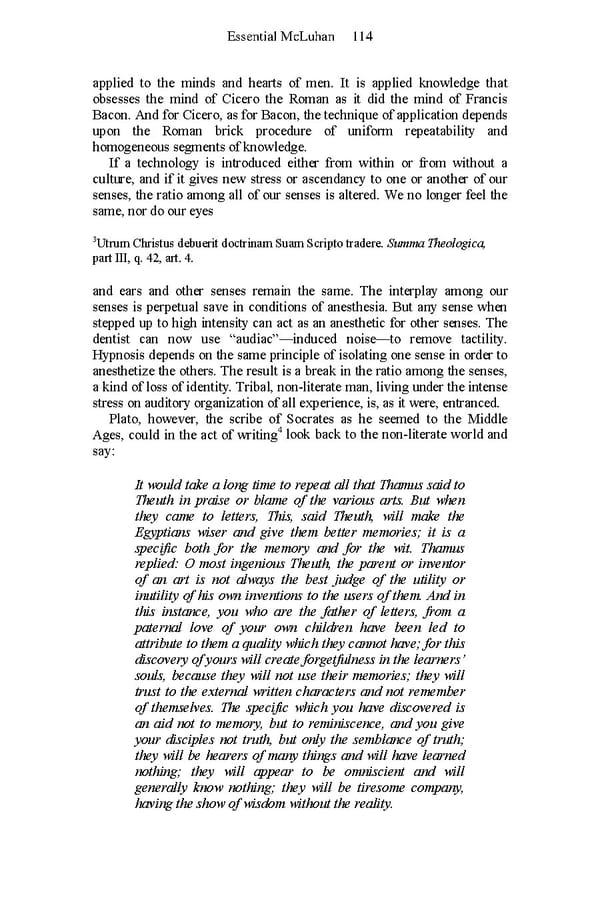Essential McLuhan 114 applied to the minds and hearts of men. It is applied knowledge that obsesses the mind of Cicero the Roman as it did the mind of Francis Bacon. And for Cicero, as for Bacon, the technique of application depends upon the Roman brick procedure of uniform repeatability and homogeneous segments of knowledge. If a technology is introduced either from within or from without a culture, and if it gives new stress or ascendancy to one or another of our senses, the ratio among all of our senses is altered. We no longer feel the same, nor do our eyes 3 Utrum Christus debuerit doctrinam Suam Scripto tradere. Summa Theologica, part III, q. 42, art. 4. and ears and other senses remain the same. The interplay among our senses is perpetual save in conditions of anesthesia. But any sense when stepped up to high intensity can act as an anesthetic for other senses. The dentist can now use “audiac”—induced noise—to remove tactility. Hypnosis depends on the same principle of isolating one sense in order to anesthetize the others. The result is a break in the ratio among the senses, a kind of loss of identity. Tribal, non-literate man, living under the intense stress on auditory organization of all experience, is, as it were, entranced. Plato, however, the scribe of Socrates as he seemed to the Middle Ages, could in the act of writing4 look back to the non-literate world and say: It would take a long time to repeat all that Thamus said to Theuth in praise or blame of the various arts. But when they came to letters, This, said Theuth, will make the Egyptians wiser and give them better memories; it is a specific both for the memory and for the wit. Thamus replied: O most ingenious Theuth, the parent or inventor of an art is not always the best judge of the utility or inutility of his own inventions to the users of them. And in this instance, you who are the father of letters, from a paternal love of your own children have been led to attribute to them a quality which they cannot have; for this discovery of yours will create forgetfulness in the learners’ souls, because they will not use their memories; they will trust to the external written characters and not remember of themselves. The specific which you have discovered is an aid not to memory, but to reminiscence, and you give your disciples not truth, but only the semblance of truth; they will be hearers of many things and will have learned nothing; they will appear to be omniscient and will generally know nothing; they will be tiresome company, having the show of wisdom without the reality.
 Essential McLuhan Page 120 Page 122
Essential McLuhan Page 120 Page 122